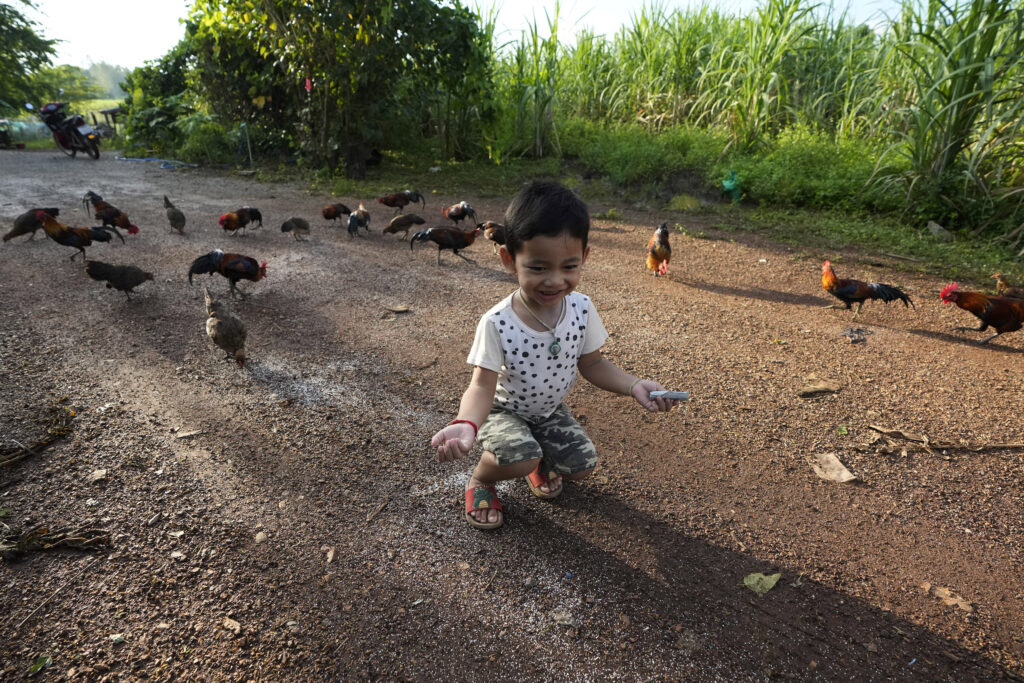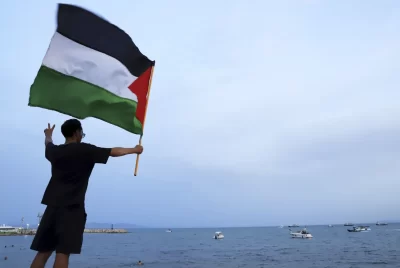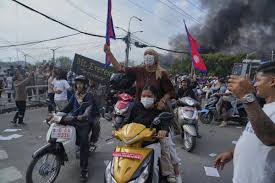
Thanathorn Sopha, son of Maliwan Lasopha who was killed in a knife and gun attack at The Young Children's Development Center, feeds chicken at house after school in the rural town of Uthai Sawan, in Nong Bua Lamphu province, northeastern Thailand, Wednesday, Oct. 4, 2023. (AP Photo/Sakchai Lalit)
In a simply built concrete house a few meters (yards) off a dirt road in the rural town of Uthai Sawan in northeastern Thailand, Tawee Lasopha wakes up before sunrise to catch fish from his pond, then moves onto household chores with his wife, cooking breakfast and preparing his grandchildren for school.
Under the blazing morning sun, he walks his two young grandsons out to the main road to wait for their school van before going about his day, picking vegetables and weeding.
It’s an idyllic scene, and not so rare for the Thai countryside. But a dark cloud hangs over Tawee and his village. His family is forever scarred by the sudden loss of the boys’ mother, who died last year in Thailand’s deadliest mass killing, in which 36 people were killed, including 24 toddlers.
Although the shock was felt all over Thailand, highlighting gun control issues, memories of the tragedy had largely faded outside the village until this past Tuesday, when a 14-year-old boy with a handgun shot dead two people and wounded five others at an upscale mall in the country’s capital, Bangkok.
“These kinds of incidents seem to happen more as days go by. If the law is stronger, it might help reduce them, but if we continue as we are now, that won’t happen. Things will remain the same,” Tawee said this week in an interview at his home.
On Friday, Tawee marks the first anniversary of the death of his daughter, Maliwan Lasopha. She was one of the two teaching staff among the three dozen people killed by a former police officer who carried out a grisly gun and knife attack at the local day care center in Nong Bua Lamphu province, which is in one of Thailand’s poorest regions.
“I lost hope. I don’t know how much longer I can go on like this,” Tawee said softly as he sat on his home’s porch, which he fashioned himself. He repeatedly turned with sad eyes to cast a glance at a framed portrait of Maliwan, his youngest child, who died at the age of 34.
Tawee, now 59 and unemployed, lives with his 58-year-old wife Mongkol Uppachai, trying to make ends meet to help support three grandchildren, two of whom are Maliwan’s offspring. Tawee said he continues to fish and farm vegetables on his land to sell, but most of the household income comes from Maliwan’s widower, who now works in the neighboring country of Laos and only comes back to visit a few times a year.
Tawee and Mongkol laugh and play cheerfully with their grandchildren, their voices lilting with joy around the kids, but betray sadness when speaking about the loss of their daughter. Tawee recalled that Maliwan, who was a strong personality not inclined to speaking in an overly sweet manner, was well loved by the children, their parents and her colleagues.
“These days, when I go out to see neighbors, they tell me to forget. How could I forget? I can’t forget it for the rest of my life,” he lamented. “This child… I can’t forget.”
His small town remains shaken in the aftermath of the gruesome mass killing, which also upended the relatively secure, if modest, existence Tawee’s family once had.
The former welder said his daughter always worked hard to help out the family, in which she was the only one with a regular income. Her prospects looked good, as she was about to get her state-certified degree in non-formal education before the attack occurred.




